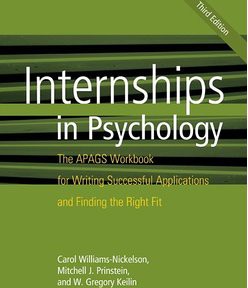 First, the GOOD NEWS! The 2016 APPIC Match statistics continue to demonstrate improvement in the Match rate for internship applicants. Logically, the improved numbers would abate much of the nervousness about tackling the internship process.
First, the GOOD NEWS! The 2016 APPIC Match statistics continue to demonstrate improvement in the Match rate for internship applicants. Logically, the improved numbers would abate much of the nervousness about tackling the internship process.
However, for graduate students like me who fit the mold of the perfectionistic-overachieving-anxious student, logic can do little to diffuse internship worry. The wake of the 2012 Match rate still haunts many of our programs and, thus, pushes us to be ever more competitive for the internship process.
As a recent survivor of the Match, the fears still resonate. However, I am able to recognize that my success in matching (along with nearly 90% of all internship applicants) was not a fluke. [In my mind, the fluke is that the Match rate is not flirting with 100%, but we are inching closer!] Moreover, internship applicants have several resources to help them prepare for this arduous process, particularly at APA Convention.
For 2017 applicants (or the Type-A 2018, 2019, or 2020 applicants), APAGS provides an Internship Track at Convention, which consists of three key sessions to help you understand the internship application process and talk with the key players in the game. As a veteran of these sessions, I would highly recommend them. As a self-proclaimed perfectionistic-overachieving-anxious graduate student, I found significant value in attending these sessions in both Washington DC (2014) and Toronto (2015).
 The Internship Workshop is a two-hour session geared towards working through the Internships in Psychology workbook. You will receive expert advice and suggestions on how to sell yourself in your application documents, and some mysteries of the ranking and Match process will be unfolded. You can also expect to learn more about the vague and elusive concept of fit. What is fit? How do I find fit? Can you help me find fit? Do I really need fit?
The Internship Workshop is a two-hour session geared towards working through the Internships in Psychology workbook. You will receive expert advice and suggestions on how to sell yourself in your application documents, and some mysteries of the ranking and Match process will be unfolded. You can also expect to learn more about the vague and elusive concept of fit. What is fit? How do I find fit? Can you help me find fit? Do I really need fit?
(As a personal testimony to fit, I noticed that the internship sites that did not offer an interview had two key similarities. Either a) I was only semi-excited about their program, or b) I had added them to my final list to simply boost my number of applications! They could tell that the fit was missing. I was not truly excited about their sites. They were my safety nets.)
The Internship Track also offers sessions that serve as informal spaces to talk with Internship Training Directors and the APPIC Chair. At the Internship Meet and Greet, you have the opportunity to meet with Training Directors from myriad sites to learn about their sites, ask questions about the process, or just sit back and listen! During the Conversation Hour with the APPIC Chair, you can learn more about the big picture of the internship process and ask questions about APPIC accreditation, APA accreditation, rankings, and the Match (and hopefully through the process experience some diminished anxiety and increased calm about this phase in your training).
As you prepare for Convention 2016 and your upcoming application process, I wish all 2017 internship applicants an application process filled with self-confidence, support, and self-care. I hope to see you all in Denver!
Editor’s Note: Other APAGS Programming Tracks include: Diversity, Professional Development, and Science. Check out all APAGS Programming and social events.


 As a student member of the APA and a psychologist in training, I’ve been disappointed in the
As a student member of the APA and a psychologist in training, I’ve been disappointed in the 
 First, the GOOD NEWS! The
First, the GOOD NEWS! The  The Internship Workshop is a two-hour session geared towards working through the
The Internship Workshop is a two-hour session geared towards working through the